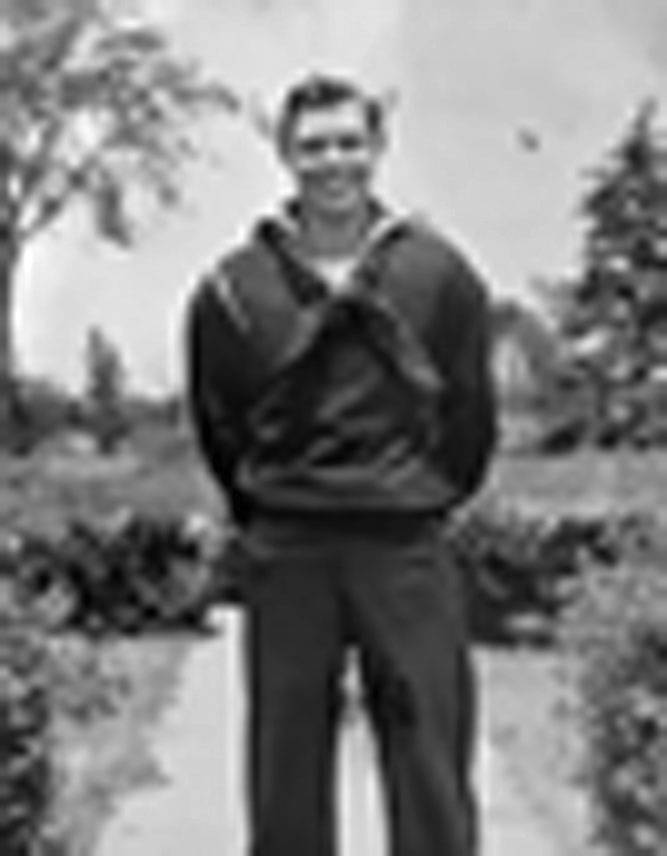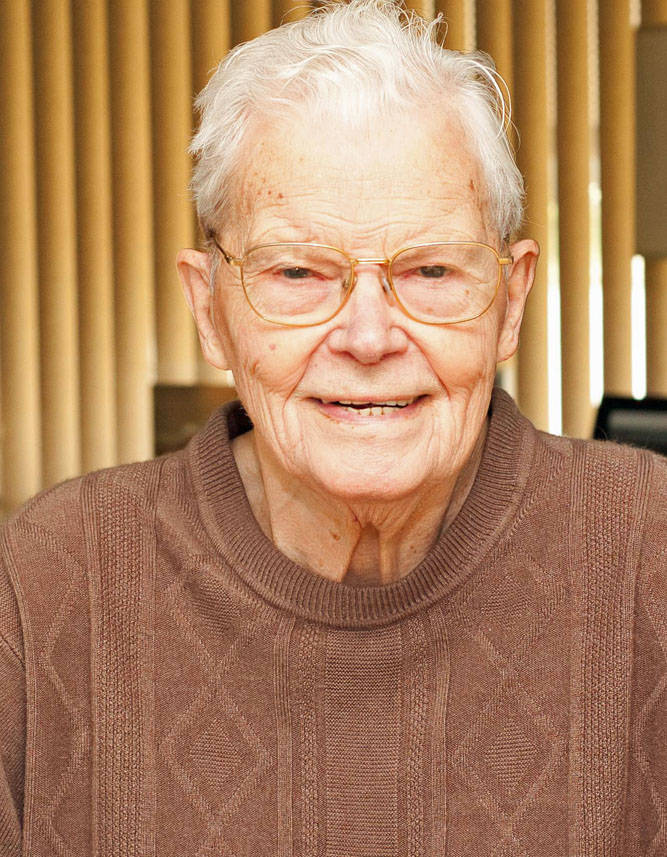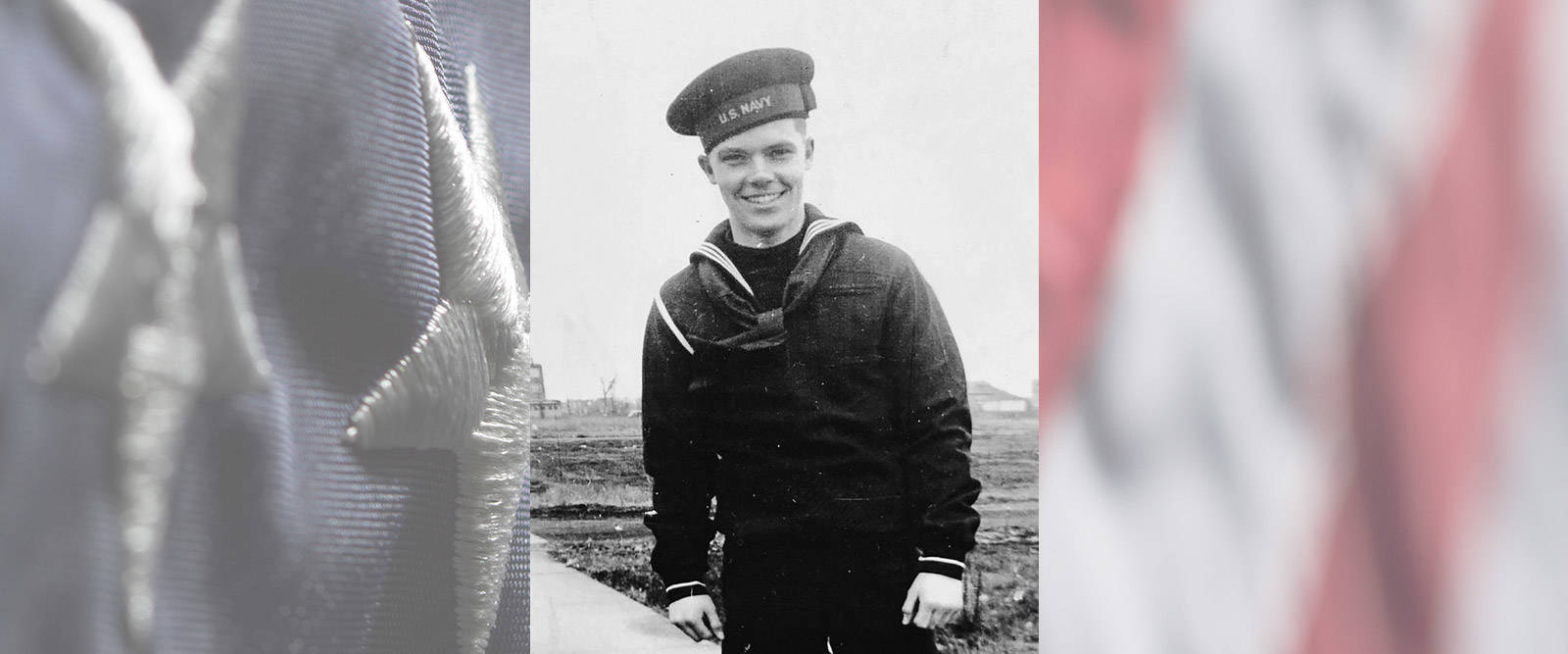U.S. Navy World War II Thornton, IL Flight date: 05/09/18
By Andy Dunning, Honor Flight Chicago Veteran Interview Volunteer
Like many Americans during World War II, Gordon Vaundry felt a deep sense of patriotism that pulled him to serve his country.
Born in La Crosse, Wisconsin, Gordon and his mother moved to Chicago after his parents divorced. He grew up on the South Side and attended Hyde Park High School where he played baseball and football. Gordon’s life took a serious turn on December 7, 1941, the day Japan bombed Pearl Harbor in Hawaii. The high school senior and his friends had just finished watching a movie at the Piccadilly Theatre when they heard the news.
“As we were walking out, we saw a crowd of people around the upright radio,” Gordon says. “We asked what was happening when one of them said the Japanese had bombed Pearl Harbor.” As a teenager, Gordon felt a swell of patriotism in his heart. “Patriotism was very strong back then. The next day, five of us went to enlist.” According to Gordon, the Navy was still using peacetime qualifications to assess recruits. Four of his friends were disqualified for a variety of reasons, including flat feet, a ruptured eardrum and high blood pressure. Congress declared war on Japan that same day, and many of his friends were later accepted under draft rules, he says. Gordon finished his senior year of high school and graduated in February, 1942. “One week after graduation, I was on my way to Boot Camp.”
Gordon reported to Great Lakes Naval Training Station for six weeks of instruction. Following Boot Camp, the Seaman Apprentice received “cursory medical training” at the Naval Hospital Corps School, where Gordon would become a Pharmacist Mate. “They needed so many medical people, the Navy sent most of my class to pharmacy school,” he says. “But we were not really pharmacists; we were just helpers.”
The Navy shipped Gordon to Naval Air Station Moffett Field, near Mountain View, CA. The Navy used the airfield to launch anti-submarine aircraft responsible for patrolling the West Coast. Soon after arriving, he was shipped out to the South Pacific. Gordon’s new home was located on Espiritu Santo, the largest island of New Hebrides (now Vanuatu), a former colony of Great Britain and France located approximately 400 miles southwest of the Solomon Islands. They were sent to build a badly needed hospital to treat sick and injured Sailors and Marines.


“It was a beautiful island filled with coconut groves,” Gordon says. “We had to clear the trees before we could build the hospital.” The facility consisted of a series of quonset huts, which were small, semi-circle framed buildings clad with corrugated metal panels. Conditions were basic, Gordon says, and treating the wounded was challenging. “We didn’t have nurses at the time, and some of the corpsmen had never treated anyone before they got here. They were plumbers and carpenters back home, but we got really good at administering intravenous drugs and other tasks.”
Despite the picturesque surroundings, Espiritu Santo was menacing. During rainy season, the downpours lasted for 24 hours a day. Malaria was a common threat, and Gordon suffered a spell of Dengue fever. “I was headed to work, walking through the coconut grove, when I just collapsed,” Gordon says. “Some men dragged me to a bed covered with a mosquito net where I rested for weeks. I lost 30 pounds in a short time.”
In August 1942, the Allied Forces launched the Battle of Guadalcanal, its first major offensive in the Pacific. U.S. Marines made a surprise attack on the island, and fighting would continue for six months. Thousands were injured and nearly two thousand Americans were killed. Gordon was promoted to Pharmacist Mate, First Class, and he was assigned to lead the surgical team.
“The Japanese were on their way out,” Gordon says. “But they would occasionally drop ‘nuisance bombs’ to let us know they were still there. We would hear the siren, jump in a foxhole and then nothing. Every once in a while a bomb would hit nearby.”
In 1945, Gordon was sent to the Philippines. The Allied forces were gaining momentum as they pushed the Japanese out of that country. Gordon served aboard an LCT (Landing Craft Tank). “We drove right up on land,” Gordon says. “The gate would drop, and troops would get out. We would wait on the beach for the injured.”
As the conflict wound down, Gordon says they played the waiting game on Mios Woendi Island in Dutch New Guinea. “I thought we were going to take part in the invasion of Tokyo,” he says. “Then we got notice we had bombed Nagasaki, and a few days later we heard about Hiroshima. Wowee! The war was over. That was a wonderful thing. We were not expecting it.”
With the war officially over, Gordon was one of the few sailors on the island who earned enough service points for discharge, but he wouldn’t return home for some time. Gordon returned to Great Lakes Naval Training Center on December 26, 1945 and was discharged on New Year’s Eve. He arrived home for a party in his honor. He met Rita that night, and they married in July, 1946.
Gordon received a degree in physical education from the University of Illinois and a degree in physical therapy from the University of Wisconsin. After graduation, he worked part time at the Illinois Research Hospital before taking a full-time position at a private clinic. In 1956, Gordon and Rita moved to a home in south suburban Thornton. The couple raised three boys and three girls. They have 11 grandchildren and 11 great-grandchildren. Sadly Rita passed away in 2007, after the couple celebrated sixty years of marriage.
Gordon was recently recognized by the the American Physical Therapy Association for 55 years of service to the profession. “Physical Therapy was the best thing that ever happened to me,” Gordon says. “I was so happy with the job. I could really help people.”
We are thankful for your service, Gordon, and wish you a wonderful Honor Flight.



